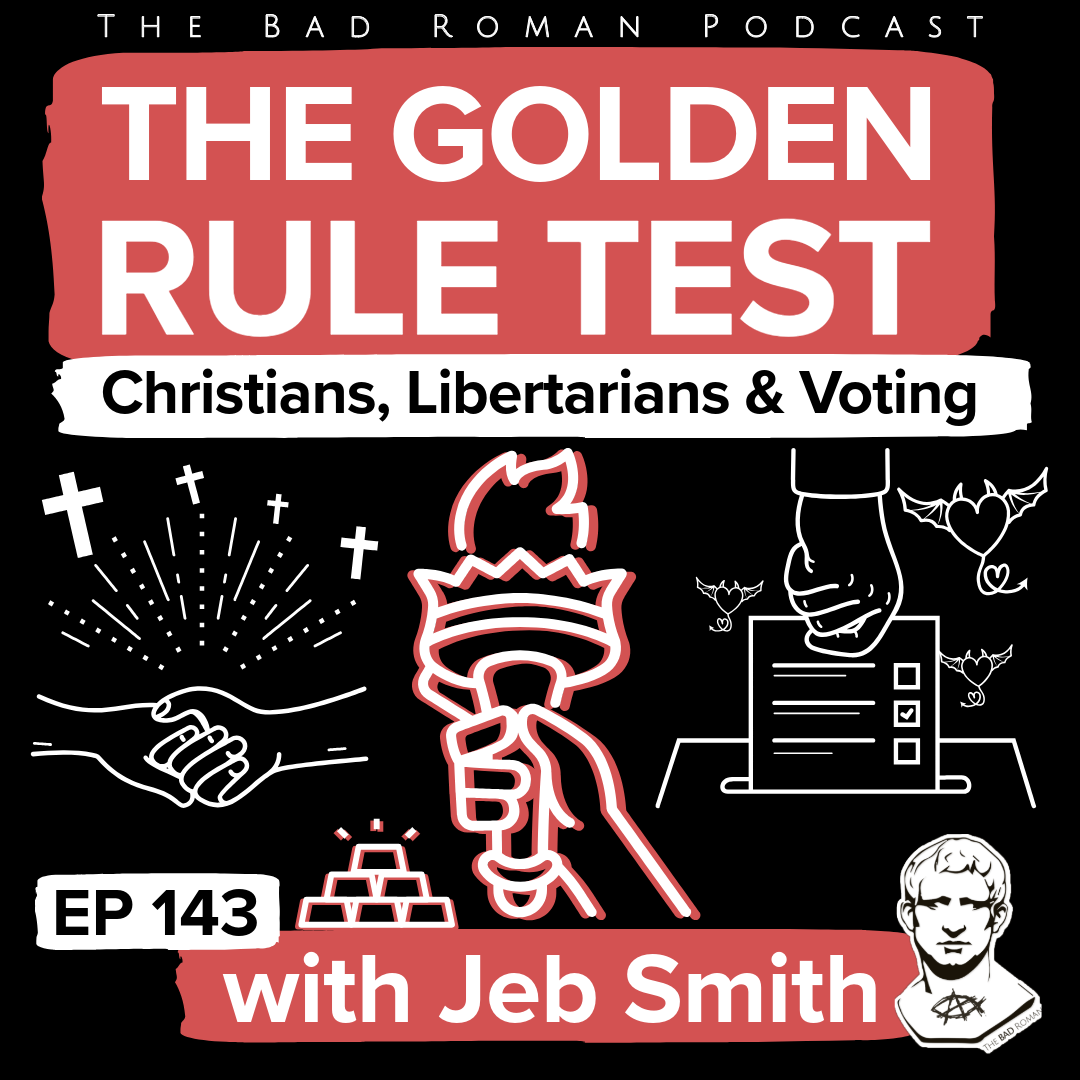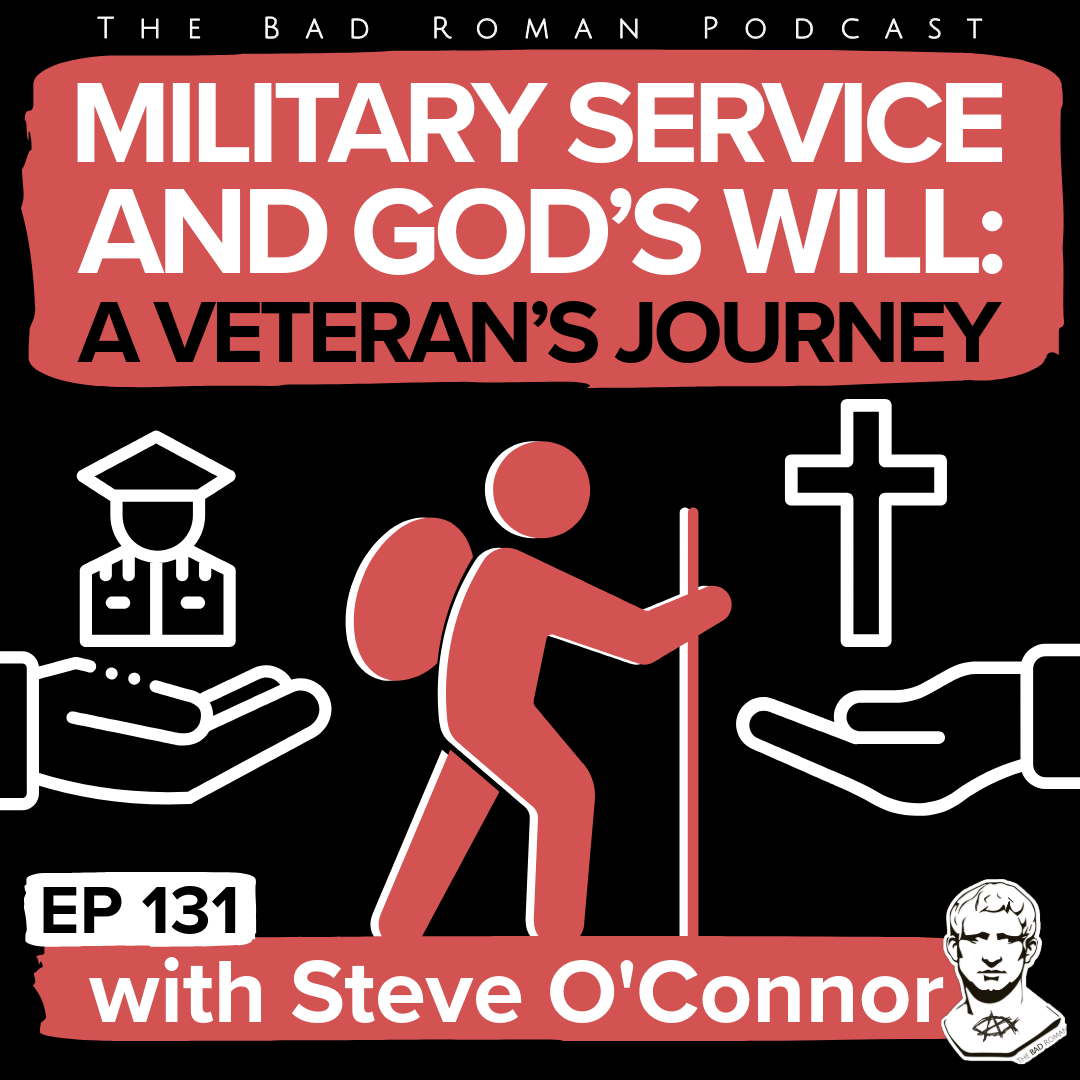There’s a version of Christianity that never really meets Jesus.
It memorizes the pledge, knows all the right political buzzwords, and can quote more politicians than church fathers. It says “Christ is King” on Sunday and “vote harder” on Monday, as if Caesar just needs a better campaign manager.
That was the air Craig and Misty both breathed for years.
They organized rallies, cheered on “good candidates,” defended the Constitution like it had been handed down on Sinai. It felt righteous. It felt Christian. It felt like fighting the good fight, until Jesus started messing with their loyalties.
This episode is the story of waking up from that spell.
Not into apathy or cynicism, but into something weirder and older: a Kingdom where the Sermon on the Mount is more binding than the Bill of Rights, and where the question isn’t “How do we save America?” but “How do we love our enemies like Christ?”
When the Flag Becomes Your Faith
Misty didn’t stumble into politics by accident. She’s a wife, mom, grandma, and restaurant manager in Arkansas, the kind of person who knows everyone at the grocery store and cares deeply about her town. For years, that care took the shape of activism: gun-rights events, local organizing, being “all in” for Team Red.
Craig remembers meeting her back then, at a Chris Ann Hall convention in Clarksville. Both of them were learning about the Constitution, the Founders, the history they never got in school. It was exciting. It felt like discovering hidden truth. And over time, that civics education started to feel a lot like discipleship.
The problem? The more energy went into “saving the country,” the less energy was left for the actual living out of the things Jesus says about enemies, violence, and power. It’s not that patriotism and faith can’t coexist, but if you’re honest, one usually ends up calling the shots.
The Class That Broke the Spell
The turning point for Misty wasn’t a Bible study. It was a civics class.
She signed up as a die-hard constitutional conservative ready to nod along. Instead, the teacher, friend of the project, Mike Gaddy, started pulling at threads: the myths about the founding, the sanitized hero stories, the idea that United States was uniquely holy.
Misty left that first session furious. She went home with a notebook full of quotes, determined to disprove him. She cracked open books, dug into history, chased footnotes… and found out the uncomfortable thing: he wasn’t lying. The founding was messier than the church bumper stickers made it sound.
One question stuck in her ribs: “When have you ever voted yourself more free?”
She thought about politicians she’d worked for who sold out the second they got in office. She thought about all the cheering for “freedom” while bombs fell on people who’d never heard of her. Slowly, painfully, she realized her “Christian” activism had quietly become devotion to the state.
When Compassion Outgrows Your Patriotism
Craig went through his own version of that. Looking back at his old voting record, neoconservative almost every time, he feels a weight. Not because voting is the worst sin ever, but because those choices empowered real people to wage real wars on real families. Once Jesus taught him to see beyond the labels, he couldn’t shrug it off as “just politics” anymore.
That’s the strange side effect of taking “No King but Christ” seriously: your compassion gets bigger than your borders. Suddenly you can’t hear about drone strikes, refugee camps, or kids in cages without thinking, Those are my neighbors too.
Misty admits she used to be the one cheering for the war, as long as the “bad guys” were far away. Now she sees faces instead of flags. The same Jesus who told her to love her literal neighbor is also Lord over the moms and dads in countries she’ll never visit. Once that sinks in, a certain kind of patriotic chest-thumping starts to feel… off.
Rage-Posting in Jesus’ Name
Then there’s the internet.
If you’ve spent any time on Facebook, you’ve met this guy: profile full of Bible verses and worship songs… and also full of posts calling people “demon-crats,” fantasizing about political dynasties, and mocking “woke queer trash” or whatever today’s latest slur is.
Misty watches one of these men in her feed whiplash between “I love Jesus so much” and “if you don’t like it, delete me, you idiots.” She finally comments, not to dunk on him, but to say: “You’re not just pushing people away from your politics. You’re pushing them away from Christianity.”
And that’s the heartbreak. People like her coworker, who told Misty, “I just wish all Christians were like you,” aren’t rejecting the real Jesus. They’re rejecting a Jesus-shaped mask worn over cruelty, contempt, and tribal rage.
Craig points out the obvious but rarely-said thing: if someone only knows Christians like that, of course they want nothing to do with our faith. Why would they? The fruit is rotten.
Taking It Offline
One of the most practical parts of this conversation is embarrassingly simple: take it offline.
If you’re going to challenge someone you know, about their politics, their rhetoric, their discipleship, do it face to face if you can.
Tone is different when you’re sitting across from a human you share a town and a table with. You can see their expression, hear their hesitation, notice when they’re actually trying to be loving but clumsy. On Facebook, all you see is words and your own projection of malice.
Misty and Craig have both seen it over and over: online, people are ready to torch each other. In person, they’re softer, more open, more aware that the other person has a story too. If “No King but Christ” is going to mean anything in our politics, it’ll show up in those small, awkward, holy in-person conversations.
Little Kingdom Cells in Arkansas
Out of all this wrestling, Misty has quietly started something small in Russellville, a little circle of younger folks trying to figure out what it means to follow Jesus instead of party platforms. Just a group of people who gather to read Scripture, wrestle with current events, and ask, “Would Jesus really be okay with this?”
They practice disagreeing without dehumanizing. They experiment with actually blessing enemies instead of owning them.
It doesn’t look like much. But neither did twelve confused disciples in Galilee.
Kingdom seeds are being scattered.
Listen & Reflect
Listen: Pay close attention when Misty talks about the class that made her angry. What would you have done with that information?
Ask: Where has your “Christian” identity quietly fused with your national or political identity?
Confess: Is there anyone you’ve treated like trash in Jesus’ name that you need to repent to?
Practice: Pick one person you strongly disagree with and invite them to coffee. Ask more questions than you make statements.
🤝Connect with MISTY hubbard:
Episode Timestamps:
(00:00) From statism to “No King but Jesus”
Craig welcomes Misty and sets the theme: deeper faith, deeper compassion.
(00:05) Meet Misty: Arkansas, restaurant, and kindness over hate
Misty introduces herself as an Arkansas restaurant manager, wife, mom, and grandma.
She jokes about “Go Hogs” and the pain of that as a sports fan.
She explains that her goal is to spread the message through kindness, not hate.
Craig riffs on how Facebook trains people to act the opposite of Jesus online.
(01:22) The Chris Ann Hall rally and early constitutional days
Craig and Misty remember meeting at a “Second Amendment” rally in Clarksville.
They were both learning new things about the founding and the Constitution.
Craig notes that the teacher helped him understand civics but stayed deeply statist.
Misty mentions organizing that event as part of a local gun group and later politicians.
(12:29) “Good candidates” and the lost cause of electoral politics
Craig and Misty talk about candidates who stop caring once they’re in office.
Misty calls trying to get “good people” elected a lost cause.
Craig pushes back on the idea that not voting means “doing nothing.”
They argue that handing more authority to rulers isn’t the same as loving neighbors.
(14:24) Owning neocon votes and paid patriotism
Craig admits he voted for neoconservatives almost every time and feels responsibility for what those politicians did.
Misty describes “paid patriotism:” the millions spent to keep people flag-waving.
They call out propaganda around the anthem, sports, and outrage over who stands or kneels.
The conversation exposes how manipulated our sense of “duty” often is.
(15:31) “Vote harder” and the salsa break
Misty notes how division is stirred up so we’ll “vote harder” for our team.
Craig jokes about needing to hold your mouth just right in the voting booth.
The Bad Roman salsa jingle kicks in, inviting listeners to support the show instead of the state.
They come back from the break still poking at the myth that voting is the highest form of action.
(16:25) The class that wrecked Misty’s civic religion
Craig walks Misty through how, after her event organizing, she met Mike Gaddy.
Her first class with him made her furious as a constitutional conservative.
She went home, took notes, and researched to try to prove him wrong.
Instead she confirmed that the founding was ugly and we’d been sold a myth.
(18:00) When have you ever voted yourself more free?
Misty recalls Gaddy’’s question about whether we’ve ever “voted ourselves more free.”
They wrestle with the claim that soldiers are “over there fighting for our freedom.”
Craig and Misty ask what our “freedom” was doing in Somalia while bombs fell on children.
They connect this to a broader realization that empire and Kingdom serve different masters.
(39:29) None of us were born anarchists
Craig notes that most anarchists he knows started out statist, just like him and Misty.
They mention friends like Gaddy whose stories include serious regret.
Misty laughs about her Facebook memories reminding her how statist she used to be.
Craig jokes about “accidentally” losing access to his old account and starting fresh.
(47:40) Compassion that outgrows the flag
Craig says that taking “No King but Jesus” seriously changed how he views war and cages at the border.
Misty admits she used to cheer for war and “get the bad guys at all costs.”
Now she sees people in other nations as God’s children too, not faceless enemies.
(52:16) A daily Jesus lesson at work
Misty talks about a coworker who didn’t believe at all but loved their daily conversations.
The coworker told her, “I just wish all Christians were like you.”
Misty compares fake Christians to people wearing a Lakers jersey without playing for the Lakers.
She says Jesus teaches and shows you to treat people with kindness, not contempt.
(55:48) “Founded on Christian values?” vs cursing your enemies
Craig reads a meme fantasizing about a decades-long MAGA dynasty and calling opponents vile names.
He asks how anyone can say “we’re founded on Christian values” while talking like that.
Misty says this kind of faking pushes people like her unbelieving friend away.
(57:04) You’re pushing people away from Christianity (not just politics)
Misty shares another post where the same guy curses “demon-crats” and tells him to delete him.
Someone tells him he’s pushing people away from Christian conservative Republicans.
Misty comments that he’s pushing people away from Christianity, period.
They both highlight how the same feed includes sweet Jesus posts right after hateful rants.
(58:00) Take it offline: Face-to-face hits different
Craig asks if Misty knows the guy personally and encourages her to talk with him in person.
He notes that tone is completely different face to face than on Facebook.
Misty says if you perceive a comment as snarky online, it’s snarky, whether it was meant that way or not.
Seeing someone’s face makes it clear when they’re trying to be loving, not hateful.
(59:10) The solution: Be more like Jesus
Craig directly asks Misty what the solution is to Christians entangled with the state.
She says it plainly: be more like Jesus as best we can.
Treat people the way Jesus would, especially those you disagree with.
They agree that this is how you actually win people over and introduce them to Christ.
(1:04:12) Misty’s local Russellville group
Misty describes a small, unofficial local group she’s started with younger folks.
They share Jesus’ teachings and plug them into current events like the Charlie Kirk story.
She pushes members to ask if they’re taking verses out of context or truly following Jesus.
(1:08:08) Stepping back from social media and cat memes
Craig talks about unplugging from social media after some heavy events like the Kurt murder.
He reminds folks that what they heard is a snapshot of his and Misty’s usual conversations.
Misty jokes about posting cat memes with Craig’s face, and Craig embraces being the “crazy cat lady.”
Highlights & Takeaways
The more seriously Craig and Misty take Jesus, the more compassion they feel for people their teams used to call enemies.
“When have you ever voted yourself more free?” became a crucial question in leaving statism.
Paid patriotism and propaganda keep people outraged, divided, and committed to “voting harder.”
Social media rants about “demon rats” and “woke” enemies push people away from Christianity, not toward it.
Face-to-face conversations reveal tone and care in ways Facebook never can.
Ordinary kindness at work—a daily Jesus lesson—can open hearts more than any argument.
Local, informal groups like Misty’s in Russellville help people work out what “Christ is King” really means in practice.
100% of donations beyond production costs go to Memphis-area charities, keeping the project rooted in real-world love of neighbor.
Calls to Action
If this episode helped disentangle your faith from the state and grow your compassion, share it with someone still stuck in “vote harder” mode.
If you want to help keep the message of No King but Christ in people’s feeds, visit Spotfund and search “No King but Christ.” Even five or ten bucks a month helps keep the show going and supports local Memphis charities beyond production costs.
If you’re near Russellville, Arkansas and want to dive into these conversations in person, find Misty Hubbard via the Bad Roman Facebook page and ask about her group.
Love y’all.



































